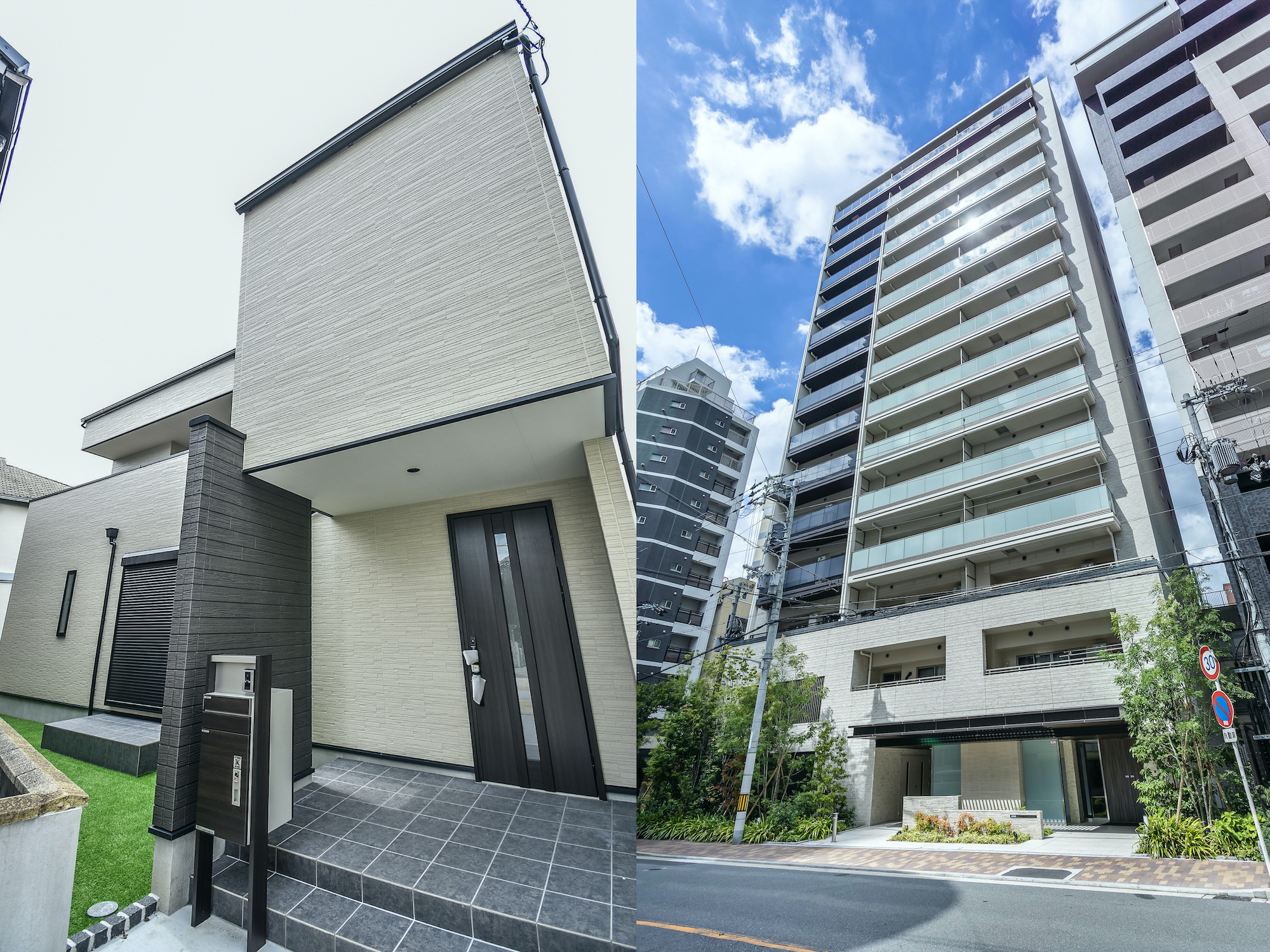Tips for making choices which are right for you
Even though they are the same “home,” condominiums and detached houses are valued very differently. This will differ from person to person based on what those want in a home. We will clearly state the axis of judgment, and we would like you to consider which one is right for you.
We believe there are three things we look for in a house.
Older properties, even with new earthquake resistance, have a high collapse rate.
The first is “safety against disasters.” 238 people died in the Noto Peninsula earthquake on January 31, 2024, 63% of them from crushing death and suffocation/respiratory failure. The percentage of so-called old earthquake-resitant houses built before 1980, when current earthquake-resistance standards were not introduced, in Suzu City, Ishikawa Prefecture, was 65%, the highest among the 1,086 cities, towns, and villages in Japan.
In the Great Hanshin-Awaji Earthquake, 104,906 dwellings were totally destroyed and 6,433 people were killed. According to the Hyogo Medical Association, of the 5,488 people whose deaths were directly attributable to the earthquake (original cause of death) between January and June 1995, 4,224 (77.0%) were by far the most common cause of death (suffocation/pressure death).
Data from the 2016 Kumamoto earthquake showed that old earthquake-resistant buildings were more prone to total collapse, and even after the new earthquake-resistant buildings, the older the building the higher the collapse rate.
Wooden structures which deteriorate over time have a relatively high risk of collapse. In addition, there are grades for earthquake resistance in housing performance evaluations. This grade is equivalent to the Building Standard Law and is grade 1, 1.25 times higher than the Building Standard Law is grade 2, and 1.5 times higher than the Building Standard Law is grade 3.
According to the subsequent survey results of the Kumamoto earthquake, 60% of the buildings were undamaged at the Building Standard Law level, 40% were damaged, and 6.3% collapsed or were badly damaged. At grade 3, 87.5% were undamaged, and the remainder suffered only minor damage or minor breakage, revealing the differences in performance. The first priority is to live in a house with a high earthquake resistance rating.
Improved insulation improves various diseases
The second priority for a house is insulation and comfort, which is a health-related issue. Japanese houses are cold in winter and hot in summer. This is due to low insulation performance, which is comparable to that of developing countries. If insulation performance can be improved to the level of developed countries, airtightness can be improved, and 24-hour ventilation can be improved, it will be possible to create an environment in which people can live in just a t-shirt in the winter.
According to the results of a long-standing study conducted by Professor Atsushi Iwamae of Kinki University, the level of insulation performance of the place you move to makes a big difference in the improvement rate of various diseases. Allergic rhinitis, cold hands and feet, bronchial asthma, and atopic dermatitis are all improved. This is the effect of good indoor air quality.
Heat shock, which can cause strokes and myocardial infarctions due to sudden temperature changes, often occurs in the bathroom in winter among the elderly. The Ministry of Health, Labor and Welfare estimates that 19,000 people die while bathing each year.
The third thing to look for in a house is asset value, which is a matter of money.
The third thing people look for in a home is assets, which is a money issue.
The price of a condominium may increase from the purchase price, but this may not the case for detached houses. Condominiums allow anyone to build assets when changing residence, but detached houses require people to continually live in them for 22 years, which is the lifespan of a wooden structure. The transaction price of a used detached house is the land price + the building price after depreciation, but while the land price is stable and almost never goes down, the building price reaches zero valuation in 22 years.
Detached houses can make a big difference in valuation.
Let’s evaluate condominiums and detached houses from the three evaluation axis of safety, insulation, and asset value. The apartment building is made of reinforced concrete, so the risk of being crushed to death is low, and although it’s cold inside in the winter, it’s not cold enough to cause “heat shock.” Although it cannot be said that they are very good, all properties have a score of around 70 out of 100 in these two points, and there is no big difference, so there is a certain sense of security.
That’s why the difference is in asset quality, and it has been proven that the way prices go down varies greatly depending on the location, and it is easier to build assets in tower apartments in the city center.
The asset value of a detached house can only decline due to depreciation of the building price, and there is little hope for the price to rise. On the other hand, safety and insulation are at the discretion of the builder, and the evaluation scores can vary widely, ranging from 30 to 90 points. While all condominiums score around 70 points, the reality of the detached house industry is that there is a huge difference in scores from those which exceed such a score (70) to those which are far below that score.
There are two types of houses: detached houses for sale and custom-built houses. It is safe to say that those for sale are out of the question, at least those that do not have a housing performance rating certificate. Safety is determined by the seismic performance and antidegradation rating, and insulation by the insulation rating. It costs tens of thousands of yen to obtain these ratings. We have to assume that the reason why they do not do it is because it would only result in a low evaluation.
Performance is paramount for detached houses.
Even in custom-built houses, there is a big difference in the performance of homes. We must remember a house which neglects life and health issues is no longer a home, but a “weapon” in the event of a disaster. The cost is not a significant amount when recalculated on a monthly basis with a mortgage.
In addition, when you take out a mortgage, a group credit is included in the loan. A group credit is a life insurance policy which will be void if the borrower of the loan passes. When you buy a house, the first thing you should do is cancel any unnecessary life insurance. This is because you can get a home which contributes to your life and health.
Based on this axis of judgment, decide whether to choose a condominium for its asset value or a detached house for its life and health value. And for detached houses, let’s make performance the most important factor, and buy a house which contributes to health and longevity. You should notice a sense of happiness within a year of living here.

For additional information or any questions please contact us here
Email: info@remax-apex.com
.

